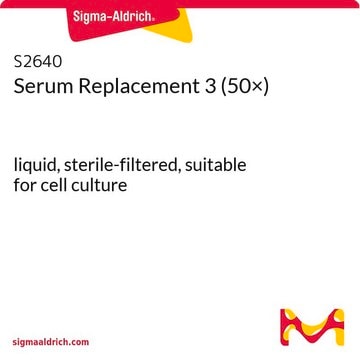Recommended Products
sterility
sterile-filtered
shipped in
dry ice
storage temp.
−20°C
General description
Serum Plus™ II Medium Supplement contains a low level of Fetal Bovine Serum (FBS) in a proprietary formulation to promote cell attachment and cell growth.
Application
Serum Plus™ II Medium Supplement is a proprietary formulation developed for researchers seeking Fetal Bovine Serum alternatives. Serum Plus™ II is a medium supplement that can be used as a substitute for fetal bovine serum in most cell culture applications.
Features and Benefits
Benefits include reduced levels of inhibitors, improved lot-to-lot performance due to better control of component materials and reduced cost compared to fetal bovine serum. This lower-cost option has been tested on a range of commonly-used cell lines and it has performed equally (and sometimes better) than Fetal Bovine Serum.
Preparation Note
Thawing
1. Remove the supplement bottles from the freezer and allow them to acclimate to room temperature for approximately 10 minutes.
2. Place each container in a 30 - 37 °C water bath or incubator. Excessive temperatures will degrade heat liable nutrients. If using a water bath, prevent the bottle caps from being completely submerged.
3. Gently swirl or shake the bottles every 10-15 minutes until the serum is completely thawed.
4. After thawing, use the supplement promptly. Liquid supplement may be stored refrigerated (2 - 8 °C) up to four weeks. To avoid freeze/thaw cycles or long periods of refrigeration, it is recommended that any unused supplement be immediately dispensed into small, useful aliquots and refrozen for future use.
Note:
Periodic agitation is crucial for optimum performance. If a bottle is not periodically shaken or swirrled as it thaws, gradients containing high concentrations of salts, proteins and lipids will form throughout the liquid portion and lead to the formation of crystalline or flocculent precipitates. These cryoprecipitates are not toxic to cell cultures, but they affect the appearance and consistency of each bottle.
Small amounts of cryoprecipitates are not uncommon, and will not affect product performance. Gently warming and mixing the supplement will generally allow the material to go back into solution.
1. Remove the supplement bottles from the freezer and allow them to acclimate to room temperature for approximately 10 minutes.
2. Place each container in a 30 - 37 °C water bath or incubator. Excessive temperatures will degrade heat liable nutrients. If using a water bath, prevent the bottle caps from being completely submerged.
3. Gently swirl or shake the bottles every 10-15 minutes until the serum is completely thawed.
4. After thawing, use the supplement promptly. Liquid supplement may be stored refrigerated (2 - 8 °C) up to four weeks. To avoid freeze/thaw cycles or long periods of refrigeration, it is recommended that any unused supplement be immediately dispensed into small, useful aliquots and refrozen for future use.
Note:
Periodic agitation is crucial for optimum performance. If a bottle is not periodically shaken or swirrled as it thaws, gradients containing high concentrations of salts, proteins and lipids will form throughout the liquid portion and lead to the formation of crystalline or flocculent precipitates. These cryoprecipitates are not toxic to cell cultures, but they affect the appearance and consistency of each bottle.
Small amounts of cryoprecipitates are not uncommon, and will not affect product performance. Gently warming and mixing the supplement will generally allow the material to go back into solution.
Legal Information
SERUM PLUS is a trademark of Sigma-Aldrich Co. LLC
Storage Class Code
10 - Combustible liquids
WGK
WGK 3
Flash Point(F)
Not applicable
Flash Point(C)
Not applicable
Certificates of Analysis (COA)
Search for Certificates of Analysis (COA) by entering the products Lot/Batch Number. Lot and Batch Numbers can be found on a product’s label following the words ‘Lot’ or ‘Batch’.
Already Own This Product?
Find documentation for the products that you have recently purchased in the Document Library.
Andrea E Murmann et al.
iScience, 23(2), 100737-100737 (2019-12-16)
MicroRNAs (miRNAs) are short double-stranded noncoding RNAs (19-23 nucleotides) that regulate gene expression by suppressing mRNAs through RNA interference. Targeting is determined by the seed sequence (position 2-7/8) of the mature miRNA. A minimal G-rich seed of just six nucleotides
Robert A Dick et al.
PLoS pathogens, 16(1), e1008277-e1008277 (2020-01-28)
Retrovirus assembly is driven by the multidomain structural protein Gag. Interactions between the capsid domains (CA) of Gag result in Gag multimerization, leading to an immature virus particle that is formed by a protein lattice based on dimeric, trimeric, and
Mark Manzano et al.
mBio, 11(4) (2020-08-28)
Kaposi's sarcoma-associated herpesvirus (KSHV) causes primary effusion lymphoma (PEL). The cellular transcription factor (TF) interferon (IFN) regulatory factor 4 (IRF4) is an essential oncogene in PEL, but its specific role in PEL and how KSHV deregulates IRF4 remain unknown. Here
Hans-Hermann Wessels et al.
Nature biotechnology, 38(6), 722-727 (2020-06-11)
Type VI CRISPR enzymes are RNA-targeting proteins with nuclease activity that enable specific and robust target gene knockdown without altering the genome. To define rules for the design of Cas13d guide RNAs (gRNAs), we conducted massively parallel screens targeting messenger
Hamza Celik et al.
Cancer cell, 34(5), 741-756 (2018-11-14)
How specific genetic lesions contribute to transformation of non-malignant myeloproliferative neoplasms (MPNs) and myelodysplastic syndromes (MDSs) to secondary acute myeloid leukemia (sAML) are poorly understood. JARID2 is lost by chromosomal deletions in a proportion of MPN/MDS cases that progress to sAML.
Our team of scientists has experience in all areas of research including Life Science, Material Science, Chemical Synthesis, Chromatography, Analytical and many others.
Contact Technical Service






